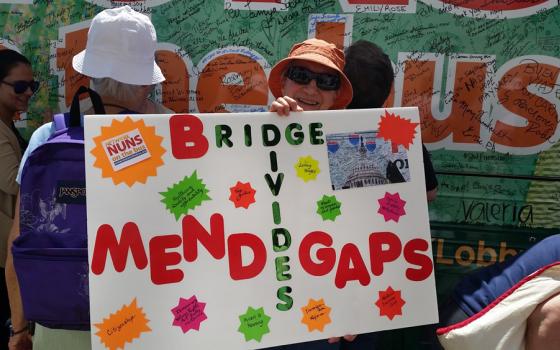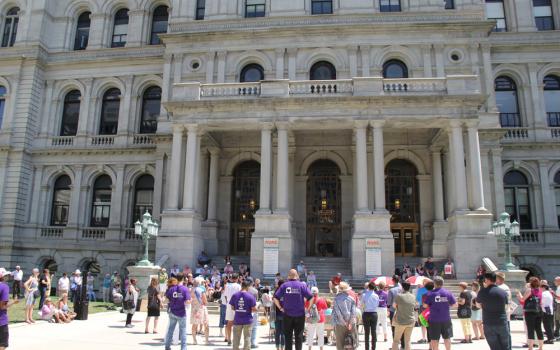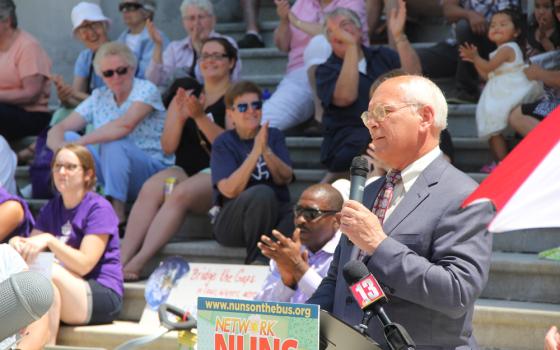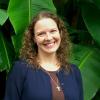Global Sisters Report brings you special coverage during NETWORK's 2016 Nuns on the Bus tour, which started July 11 in Wisconsin, runs through the Republican National Convention in Cleveland, Ohio, and concludes July 29 at the Democratic National Convention in Philadelphia. See more photos day by day, News from the Road blogs and videos from NETWORK Lobby, the sponsor of Nuns on the Bus.
The disciples approached Jesus and said, "Why do you speak to the crowd in parables?" He said to them in reply, " ... This is why I speak to them in parables, because they look but do not see and hear but do not listen or understand ... But blessed are your eyes, because they see, and your ears, because they hear. Amen, I say to you, many prophets and righteous people longed to see what you see but did not see it, and to hear what you hear but did not hear it." — Matthew 13:10-17
On the 10th day of the Nuns on the Bus tour, we encountered more of the heartbreak and hope that we enter more deeply each day on this journey throughout U.S. cities and towns.
On Thursday, we departed early from our overnight stay at the motherhouse of the Sisters of St. Joseph of Rochester, New York, and began our day, as we always do, with communal prayer, followed by a long period of silent meditation and Mass Scripture readings. Many of our morning reflections were from our stops Wednesday in Buffalo and Rochester, New York.
Some sisters reflected on the radicalness of the health care provided at St. Joseph's Neighborhood Center in Rochester. Established in 1993 as a ministry of the Sisters of St. Joseph by a former community organizer sister, the center provides treatment for more than 1,000 walk-in clients a year. The center is run by a small staff and more than 150 volunteer medical professionals who are able to fulfill their original purpose of studying or practicing medicine by serving the working poor and others in need. We heard directly from one patient who shared her story, as the center provides wrap-around services by providing food, hygiene bags, voter registration, housing referrals, and legal services referrals.
Other sisters shared the stories heard from the more than 200 people gathered at the Colgate Rochester Crozer Divinity School for our daily caucus event. Sisters reflected on the stories heard from those who have voices that institutions intentionally silence because of racism; the challenges of our current democracy, which doesn't allow everyone to participate fully in society; the problems those who cannot afford insurance face; and the countless issues the homeless face in their communities.
These stories, like the stories Jesus told, stretch our imaginations to envision a new society so we can work to make it happen.
The last question we ask participants at our caucuses is: What would our country look like if there were no barriers to health care, housing, living wages, family-friendly workplaces, full participation in democracy by all, and citizenship? The responses to these questions are pondered and discussed at small tables, then shared with the larger group to help all of us to tap into our creativity to dream it so we can build it.
Following prayer Thursday morning, we made our way to the steps of the New York State Capitol, where again we heard parables from those on the margins so that more people may hear, see, and understand what is called forth from us to be disciples of Christ in the world today.
We heard the story of one woman of the Working Family Coalition who is part of the Fight for $15 and a union movement. She talked of how she struggles daily to support her infant and 5-year-old son as a loyal, hardworking fast-food worker and how she had to choose again between giving birth to her son and losing her job, which supports her family.
We heard from the local Amalgamated Transit Union president, Corey Bixby, about the importance of workers' rights and from the Rev. Emily McNeill, lead organizer of the Labor-Religion Coalition of New York State, about the need for a living wage, fair share taxation, and a stronger democratic process.
Social Service Sr. Simone Campbell, executive director of NETWORK, proclaimed, "Policies made a lot of these problems, and policies can fix these problems."
Congressman Paul Tonko declared that the bus is powered by the people, and indeed it is. It is powered by the parables, the stories of heartbreak and hope of all those we meet and who sign their name to the bus to commit to doing their part to bring justice and joy into the world for everyone.
[Alison McCrary is a member of Sisters for Christian Community (SFCC) and is director of the New Orleans Community-Police Mediation Program, a spiritual adviser on Louisiana's death row, president of the Louisiana Chapter of the National Lawyers Guild (the largest and oldest public interest bar association in the country), and a social justice attorney providing legal support to international and local movements for social change.]



